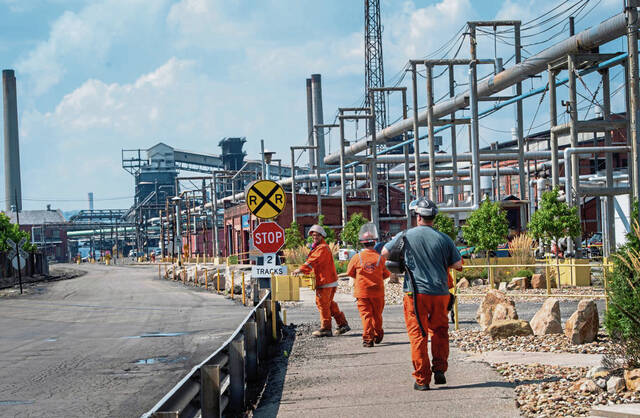https://triblive.com/business/clairton-coke-works-employees-stay-focused-despite-deadly-blast/
Clairton Coke Works employees stay focused despite deadly blast

Richard Tikey stood by anxiously until every last one of his colleagues was accounted for after a deadly blast Monday morning at the Clairton Coke Works.
He felt it was his duty as vice president of the plant’s union local to stay on scene, assist emergency responders and field concerns from colleagues worried about the future of the coke works after the explosion.
As one of the men was loaded into an ambulance after roughly four hours beneath the rubble, Tikey recounted, he handed him his boots to set aside.
When Tikey, 55, of Connellsville sat down in the plant’s bath house and took off his own boots at the end of the day — like it was any other day — a moment of reflection kicked in.
“I’m putting my boots in my locker,” Tikey thought, “and his are still out there.”
The explosion killed two workers and wounded 10 others. Five of the injured were hospitalized in critical but stable condition as of Tuesday evening, while the rest were treated and released.
But even the roughly 1,300 coke workers who escaped physical harm got a sobering reminder: There’s no promise they come home.
“It’s a good-paying job with good benefits,” Tikey said. “And yeah, the risk is there.”
‘Danger lurks’
The World Steel Association’s global membership reported 67 fatalities last year, five of which were from explosions.
Since 2005, 98 workers around the world have died from blasts in steel mills, according to the association, making them the seventh most common cause of workplace death in the sector after things like high falls, moving machinery and falling objects.
Authorities say a long investigation looms to determine what caused at least the fourth blast at the facility since 2009, and the second this year.
The union says it’ll be watching closely to ensure as much information is uncovered as possible.
“Health and safety is at the core of the work we do as a union, and everyone deserves to go home every day,” said United Steelworkers District 10 Director Bernie Hall. “We’re going to fight to ensure that this investigation into what happened is thorough and, just as importantly, transparent.”
The possible causes of disaster are plentiful in a 100-plus-year-old facility where coal is heated to nearly 2,000 degrees.
“Danger lurks,” said Clairton Coke Works mechanical repairman Andy Macey.
Still, the show must go on.
Tony Mannarino, a psychologist at Allegheny Health Network who specializes in trauma-related disorders, said it’s typical after a workplace tragedy for the employer to give everyone a few days off until they’re sure the conditions are safe.
But keeping the facility running is the safest thing to do, according to Andrew Fulton, a U.S. Steel spokesman.
“The Clairton plant is still producing coke, in a reduced capacity,” Fulton said. “For the safety of workers and the community, nonimpacted batteries need to operate, and functions like water treatment, emissions capture and environmental monitoring must continue.”
U.S. Steel officials told reporters at a news conference Tuesday at the plant that safety is their top priority and workers are encouraged to speak up if they spot potential dangers.
In a statement after the explosion, David Burritt, the company’s president and CEO, underscored U.S. Steel’s commitment to safety.
“The work we do is important and often challenging, but it should never, under any circumstances, come at the expense of safety,” Burritt said. “I end every meeting and every message with the words, ‘Let’s get back to work safely.’ That commitment has never been more important, and we will honor it.”
Getting through the day
The coke works is divided into batteries, each of which contains brick-lined chambers where coal is turned into concentrated carbon to fuel blast furnaces.
Batteries 13 and 14 were damaged by the explosion. U.S. Steel officials said Tuesday batteries 19 and 20 were also harmed by releases from pressure relief valves. The remaining batteries are running.
Macey, 70, of White Oak described the mood in the plant Tuesday as somber.
Knowing the families of the deceased will have to pick up their loved ones’ vehicles and belongings from the facility has weighed on him.
“Of course, you have to continue to focus on your job and get through the day,” Macey said.
The Allegheny County Medical Examiner’s Office identified Timothy Quinn, 39, of South Huntingdon as one of the fatalities. The other worker who was killed had not been publicly identified as of Tuesday evening.
Under the Pennsylvania workers’ compensation law, spouses or children of deceased workers are entitled to wage replacement benefits and up to $7,000 for funeral expenses.
Those hurt by the explosion also can have most of their lost wages and medical expenses paid for by the company as they recover, according to Mike Russell, a workers’ compensation lawyer in Greensburg.
Employees looking for payouts because of mental distress might have a hard time. Case law dictates mental health issues stemming from a workplace incident should be medically documented, Russell said, especially if they’re not a secondary effect of dealing with a physical injury.
It can be hard to obtain mental claims in fields where hazards — even trauma — are part of the job, like emergency medical services. Heavy industry may be as dangerous, but Monday’s disaster goes beyond what steelworkers signed up for, in Russell’s view.
“You don’t go to work expecting an explosion that’s going to blow people up,” Russell said.
A picture of strength
U.S. Steel has counselors inside the mill and union hall for workers rattled by Monday’s events. The company also has been in communication with families of the deceased and injured to offer them support.
Mannarino endorsed the use of counselors. He also predicted many workers will bounce back quickly and suggested the company be on the lookout for those who don’t. The explosion, he said, could lead to post-traumatic stress disorder in some employees.
“For the next few days, something like this is going to be in the news,” Mannarino said. “It’s a little further down the road we find out people are developing more persistent problems and they may need help over the long term.”
Whether they seek that help is another question. There’s a certain pride among steelworkers about handling their grueling jobs, often done in thickly stitched gear and sweltering heat.
“When you think of a steelworker, you think of strength, determination, resilience,” Macey said. “And yesterday shows what a true steelworker is — they’re digging with their hands to get their fellow brother out of the rubble.”
